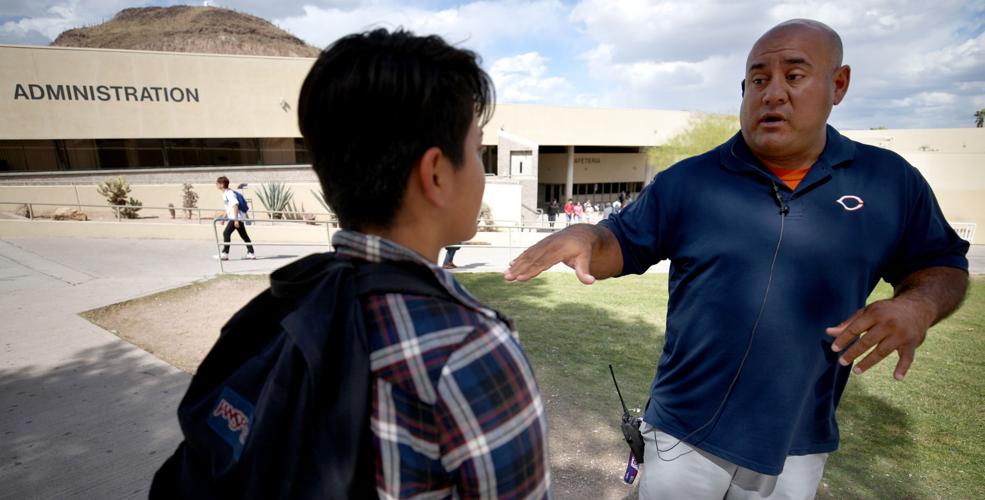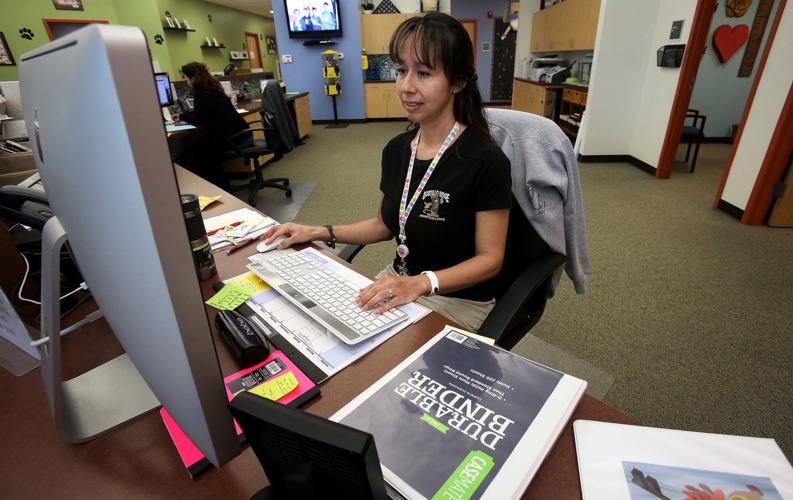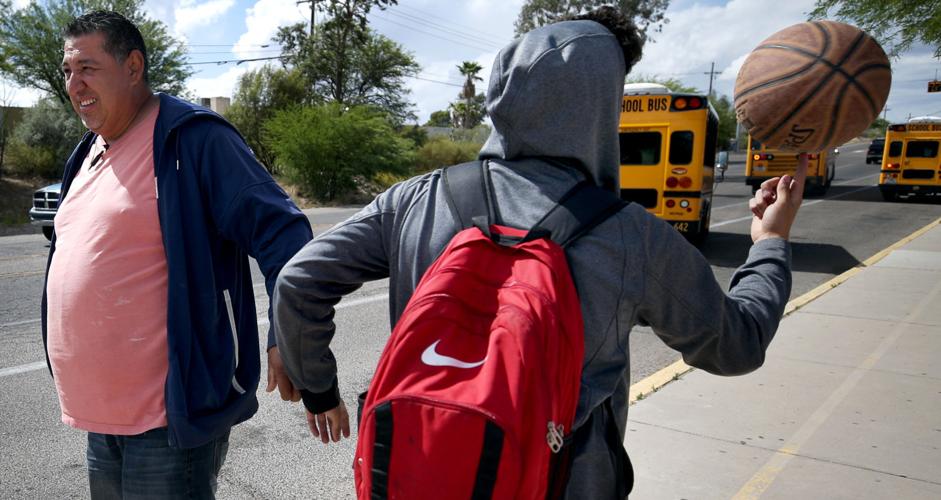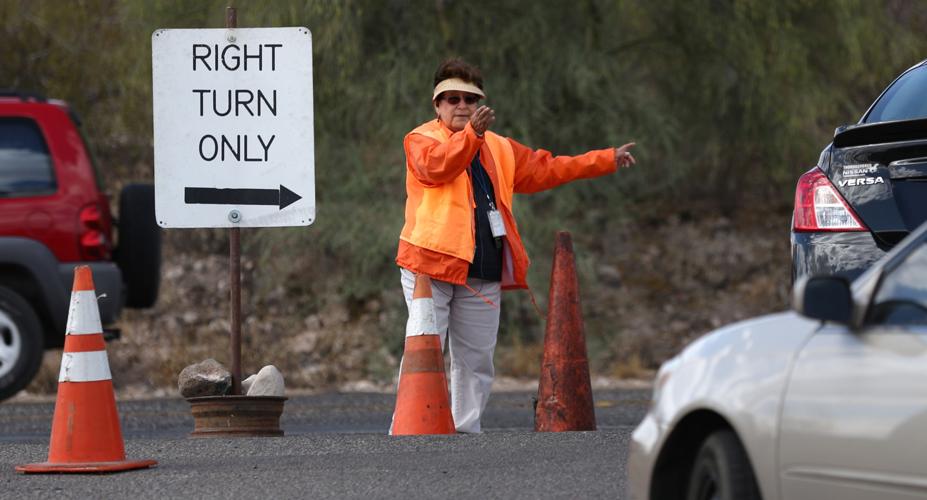Arizona’s new minimum-wage increase is costing Tucson-area school districts $2.3 million to hike the pay of nearly 2,000 employees this year.
While businesses have the option of increasing the cost of products and services to keep up with inflation, school district budget formulas are set by the state and cannot be expanded.
In November, Arizona voters approved Proposition 206, raising the state minimum wage from $8.05 an hour to $10 an hour by Jan. 1, and incrementally to $12 an hour by 2020.
The proposition also created a right to paid sick leave, which goes into effect July 1.
While employers have had time to prepare for changes to sick leave, the implementation of the wage increase went into effect almost immediately.
School districts had virtually no time to rework their budgets, most of which go to personnel. Covering the cost of the minimum-wage increase has proven to be a tall order.
MAKING ENDS MEET
Of the nine Tucson-area school districts, the minimum-wage increase has been most costly for Vail, which is investing $544,730, and Tucson Unified, spending $480,000, this year.
“As a whole, the district administration supported the idea of increasing the minimum wage,” said Lisa Cervantez, Vail Unified School District’s chief administrative officer. “It helped to pay people something livable to recruit and retain hourly staff. Not supported though was the immediacy of the implementation, meaning voters approved it in November and all the employers were required to start it January 1. That was difficult, but we did it.”
Vail and TUSD, which serve a combined 60,000 students, had to consider a combination of reducing the number of hourly and professional positions, reducing work schedules in future school years and leaving vacant positions unfilled.
Flowing Wells Unified School District is the only school district in the Tucson area that did not take a financial hit as a result of the minimum-wage increase, because no permanent employees were making below $10 an hour before Jan. 1.
According to Superintendent David Baker, the only workers who were making less than $10 an hour were student workers and substitute teachers, positions that Flowing Wells does not consider permanent.
Employees affected by the wage increase are primarily special needs care professionals, school attendance clerks and registrars, school monitors, custodians and groundskeepers among others.
Monica Rodriguez was making less than $10 an hour as a paraprofessional at Ocotillo Ridge Elementary School in the Vail School District when the minimum-wage increase went into effect. In her role as a special ed paraprofessional, Rodriguez works with two children a day to assist them with classwork and modify it when necessary. She collects data and helps with occupational, physical or speech therapy while keeping the teachers, therapist and principal informed on students’ progress.
She said that the change to the minimum hourly wage has had a positive impact on her personally.
“The fact that I’m doing what I love and am being compensated makes me feel appreciated and motivated every day,” Rodriguez said.
WAGE COMPRESSION
The increase of permanent employees to the new minimum wage has also created wage compression, meaning employees making $10 already before Jan. 1 also require raises to keep up with proper pay levels and ensure they are paid more than new hires.
At Tucson’s largest school district, TUSD, there isn’t enough room in the budget to address wage compression this year, which has resulted in concerns, especially for longtime employees, said Karla Soto, the district’s chief financial officer.
While TUSD is prepared to compensate its employees to the $10 increase in 2017 and $10.50 increase in 2018, wage compression and eventually reaching the $12 mark in 2020 create an impending challenge.
Vail has made modest increases to salaries to compensate for the issue of pay levels, but doing so pushed the district’s overall expenses to nearly $1.4 million.
The added expenses from the minimum-wage increase has reduced funding for capital and building renewal, Cervantez said.
Eight years ago, the state slashed the building renewal budget by 88 percent so districts like TUSD and Vail have instead been allocating money from the general fund where salaries come from. That money would go to things like building new schools, purchasing buses and providing textbooks .
At TUSD, the capital budget is down to just $2.5 million, which is not enough to do the job, Soto said.
“It will definitely be a financial impact that we will struggle with,” Cervantez said.
LIVABLE WAGE
Advocates for Proposition 206 recognize the impact on businesses and school districts but believe that workers getting paid fair wages will pay off in the long run.
Bill Scheel, who helped manage the Proposition 206 campaign, argued that just because minimum wage is set at a certain level doesn’t mean it’s a livable wage.
“I can understand the frustrations that school district administrators have,” Scheel said. “But the problem isn’t Prop. 206, the problem is a Legislature that consistently underfunded them for years.”
The union representing TUSD’s blue-collar employees — the American Federation of State, County and Municipal Employees — supported minimum-wage efforts, advocating for employee rights and fair wages.
“The wages coming into our workers will go back out to our local businesses as well,” said Peter Herran, the TUSD division chair of AFSCME. “In my opinion, it’s a symbiotic relationship and we have to support each other.”
Workers with children will also benefit from the sick-leave portion of the law, Scheel added.
As a result of Proposition 206, employees can accrue 25 to 40 hours of paid sick leave depending on the size of the business, according to the Industrial Commission of Arizona. This means that for every 30 hours worked, an employee accumulates one hour of paid sick leave, maxing out at 40 hours per year.
Earned paid sick time is compensated at the same hourly rate and with the same benefits, including health care. It applies to both full- and part-time employees.
Both AFSCME and the pro-Proposition 206 campaign recognize the concerns opponents have regarding the financial impact of the minimum-wage increase on school districts but believe the benefits outweigh the costs.
“If we are able to pay these low-wage workers more money, we’re going to have better outcomes for kids and that’s going to be better for schools,” Scheel said. “So I think all around, understanding that there’s some short-term pressure on school district budgets, in the long run parents are going to be making more money, which will lead to better outcomes and more economic activities for taxpayers.”
FAST-TRACKED
Those who opposed Proposition 206 were primarily against the rapid implementation schedule, which began Jan. 1. For school districts, that came halfway through the school year, when budgets had already been set.
Lea Márquez-Peterson, president and CEO of the Tucson Hispanic Chamber of Commerce, opposed the minimum-wage initiative from the start, saying it was done too rapidly for many small businesses to survive.
“I don’t think voters fully understood the impact on the nonprofit community as well as our school districts — charter and public — who can’t simply raise retail prices to cover this dramatic increase,” Márquez-Peterson said.
As a result of the increase, Márquez-Peterson predicts the elimination of certain positions or cutting back on certain operations at school districts to balance their budgets and comply with this new requirement.
“I think that increasing the minimum wage in of itself is not a bad option,” she said. “However, this is too dramatic and too soon after the recession.”
While voters had their say in November, the Arizona Chamber of Commerce unsuccessfully challenged the decision in the Arizona Supreme Court.
The chamber argued that the measure violated a constitutional requirement that any voter initiative that costs the state money must identify a funding source. However, the Supreme Court maintained that the law is indeed constitutional.
“This is not through our hands; it’s through the voters and they approved this initiative,” TUSD CFO Soto said. “It was taken to court, too, for review and unfortunately the court decided that we were to adhere to the wishes of the voters, so again this was not something we were prepared to do.”







